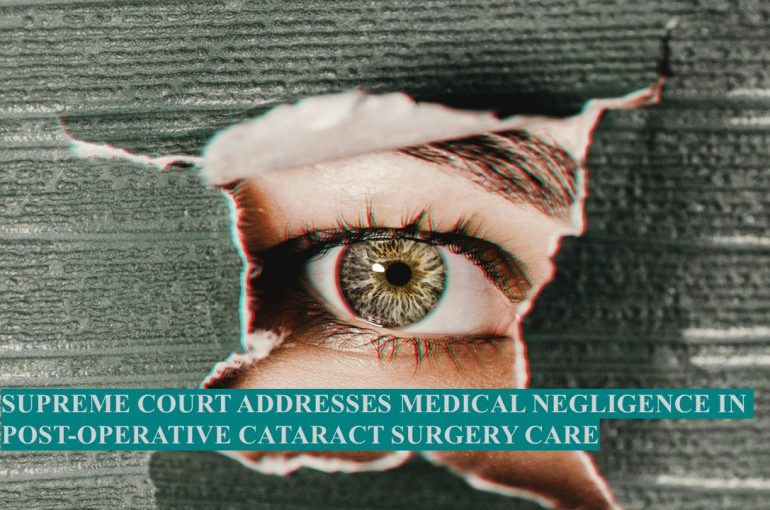SUPREME COURT ADDRESSES MEDICAL NEGLIGENCE IN POST-OPERATIVE CATARACT SURGERY CARE
The Judgment in the case of Bherulal Bhimaji Oswal (D) by LRs. v. Madhusudan N. Kumbhare CIVIL APPEAL NOS. – OF 2024 (ARISING OUT OF SLP (C.) NOS.11716-11717 OF 2019) was delivered by a Division Bench of the Supreme Court of India, comprising Hon’ble Justice Vikram Nath, and Justice Prasanna B. Varale, on December 19, 2024. This judgment deals with the issue of medical negligence in the context of cataract surgery, where the patient suffered a post-operative infection, leading to the loss of vision. The case examines the responsibilities of medical practitioners in providing post-operative care and the legal implications of failing to diagnose and treat complications.
Facts:
The Appellant, Bherulal Bhimaji Oswal, a resident of Lonavala, approached the Respondent, an eye surgeon based in Pune, for cataract surgery on January 19, 1999. Post-operation, the Appellant experienced severe pain and complications, eventually leading to complete loss of vision in his right eye. The Appellant sought medical opinions from other doctors, who diagnosed septic infection (endophthalmitis) as the cause of the damage. Aggrieved, the Appellant filed a complaint before the District Consumer Forum in Pune, alleging medical negligence and seeking compensation of ₹3,50,000.The District Forum dismissed the complaint due to a lack of expert evidence supporting the Appellant’s claim. On Appeal, the State Consumer Commission found negligence on the part of the Respondent, awarding ₹3,50,000 as compensation. The Respondent challenged this order before the NCDRC, which reversed the State Commission’s decision, holding that the infection resulted from traumatic injury rather than medical negligence. The present appeal arose from the NCDRC’s decision.
Issues:
Whether the Respondent’s actions amounted to medical negligence during the post-operative care of the Appellant.
Whether the Appellant’s self-administration of bandages led to the infection and endophthalmitis, as claimed by the Respondent.
Whether the principle of “res ipsa loquitur” applied in this case, given the severity of the Appellant’s condition.
Contentions by Both Parties:
Appellant’s Contentions:
The Appellant contended that the Respondent failed to diagnose the infection after the cataract surgery and did not provide proper post-operative care. He argued that expert opinions from other doctors confirmed that the eye had suffered from endophthalmitis, an infection caused by contaminated surgical instruments. The Appellant also invoked the principle of “res ipsa loquitur,” claiming that the negligence was self-evident, requiring no expert testimony.
Respondent Contentions:
The Respondent denied any negligence and argued that the infection was due to the Appellant’s failure to follow post-operative care instructions, particularly changing the bandage himself, which caused trauma to the eye and led to the infection.
Supreme Court:
The Supreme Court examined the facts, including medical opinions and procedural irregularities, and deliberated on whether the Respondent had exercised due care. It noted the discrepancies in the Respondent’s records and the failure to diagnose or address the infection promptly. The Court emphasized the duty of care owed by medical practitioners, particularly in post-operative management, and found the NCDRC’s conclusion unsustainable, holding the Respondent liable for medical negligence, the Supreme Court restored the State Commission’s order awarding Rs. 3,50,000 as compensation failing which the amount shall carry an interest @12% per annum.
Baddam Parichaya Reddy
The Indian Lawyer & Allied Services
Associate
Editor’s Comments:
The Supreme Court’s stand in this case highlights the importance of accountability in medical practice. The medical fraternity has time and again been negligent in providing professional services which has resulted in trauma and in some cases death. The fact that it is difficult to get third party doctors to give evidence despite their knowing that the treating doctors have been negligent has emboldened doctors and hospitals to have a “couldn’t care attitude” towards their patients resulting in several medical negligence cases which sadly are very difficult to prove. This decision is a welcome relief for several victims of medical negligence as it underscores the need for diligent post-operative care and documentation in medical treatment.
Sushila Ram Varma
Advocate & Chief Consultant
The Indian Lawyer & Allied Services





































Leave a Reply